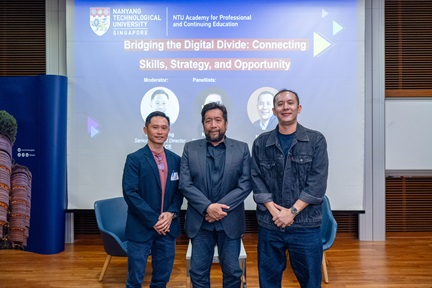Charting a Sustainable Future: How Environmental Responsibility Shapes Postgraduate Education and the Workforce

The Global Shift Towards Sustainability
There has been immense importance placed on sustainability and environmental responsibility over the years due to climate change, pollution, and resource depletion. The answer is becoming increasingly clear — the world must act now to ensure a home for future generations.
With the monumental responsibility of sustainability weighing on the world population, education and workplace sectors must step in to shape a sustainable future. This article will dive deeper into the relevance of sustainability in postgraduate education. Learn more about the skills in demand for this future, how Singapore institutions, including NTU, prepare students with relevant programmes, and the intersection of postgraduate education and sustainable careers.
Sustainability in Postgraduate Education
As education adapts to industry and climate changes, sustainability education is gaining global recognition. To be empowered for lasting change, prioritise comprehensive sustainability programmes to foster 21st-century skills through climate-focused projects and interdisciplinary approaches.
In an article on the rise of Sustainability Master’s programmes, Antonella Moretto, Associate Dean of open programmes at Stanford, notes that sustainable economic growth hinges on enhancing social welfare, efficient resource management, global environmental protection, and promoting business ethics. As a result, school programmes carry an increasing weight in concepts such as responsible business, social innovation, and sustainable business models.
Skills for The Future
To deliver on their sustainability strategies, both now and in the future, organisations must be able to draw on a diverse workforce equipped with a broad range of skills — technical and knowledge-related.
LinkedIn Global Green Skills Report 2022 underlines the scale of the problem. Over the past five years, job postings for green skills have surged 8% annually. Employers demand expertise in sustainable fashion, water management, safety, and sustainable business strategies. Embracing sustainability allows companies to cut costs and boost revenues, making it the frontier for innovative companies.
Many existing jobs will soon demand green skills as companies across sectors adopt more environmentally sustainable practices and develop sustainability targets for compliance and reporting. For instance, as more buildings and transport systems go green, skills such as Green Facilities Management are seeing a growing demand of more than 2,000%.
Clusters of priority skills are required across multiple sectors supporting the Green Economy. These priority skills are needed in more than 450 job roles across 17 sectors. These sectors range from manufacturing, trade and connectivity to information and communication technology, financial services, hospitality, and the built environment.
Education’s Role in Shaping Sustainability
Institutes of Higher Learning (IHLs) encourage youth and the workforce toward exciting opportunities in the green economy. Green skill needs and tailored training programmes are identified accordingly through collaboration with industries. In 2022, over 800 students enrolled in full-time Pre-Employment Training (PET) programmes focused on environmental sustainability, with IHLs also incorporating sustainability across various PET programmes.
NTU has also been stepping up its sustainability offers in recent years. Last year, NTU joined key partners like GCNS, PSC Singapore, WTW, and WBCSD to introduce exciting new corporate sustainability and sustainable finance courses. These courses empower business executives with the skills needed for a sustainable future, giving students an edge in this new era of pro-sustainability.
NTU is no stranger to the role of interdisciplinary studies in sustainability education. Besides being among the top 25 institutions globally with the most influential scientists mentioned, NTU recently initiated a $50 million research programme on climate change, backed by $47 million from the Ministry of Education.
As a premier research-intensive institution, NTU recognises the urgency of global sustainability challenges. It has cultivated its sustainability prowess through education, research, and innovation. In 2021, NTU made history with a 15-year Sustainability Manifesto, pioneering as the world's first University to introduce a Sustainability Linked Bond.
The Intersection of Postgraduate Education and Sustainable Careers
Postgraduates can weave sustainability into their continuing education through awareness and specialised courses. Explore seminars and attend workshops or classes such as NTU's Graduate Certificate in Sustainability for Strategy, Energy, Environment, and Circularity, which is also credit-bearing and stackable towards the relevant certificate.
Today, progressive businesses are beginning to recognise the enduring challenges of climate change, resource scarcity, and population growth. These businesses require professionals who possess a visionary outlook, can inspire change, and seek those with keen business acumen to spot risks and opportunities.
A Business in the Community (BITC) report on 'Upskilling for a Sustainable Future' found that 90% of businesses see strong leadership skills as crucial for sustainable transition, with 70% anticipating a skills gap challenge.
Postgraduate education is the key to moulding future sustainability leaders, offering a profound opportunity to deepen understanding beyond surface-level awareness.
The Ministry of Education calls on Institutes of Higher Learning (IHL) to update curricula for the green economy, urging them to offer specialised training to excel in emerging green jobs and adapt existing roles to sustainability. Beyond preparing students for sustainable careers, NTU's Environment and Sustainability Research Cluster drives innovative, interdisciplinary research in sustainable environments, urban sustainability, smart cities, and social resilience.
As the world faces mounting environmental, social, and economic challenges, the need for skilled and passionate leaders in sustainability has never been more pronounced. Postgraduate education serves as the incubator for these future leaders, providing them with the knowledge, interdisciplinary perspectives, research skills, and leadership qualities necessary to tackle the complex issues of the current time.
Embracing Sustainability: A Final Push for Your Postgraduate Journey and Career
As postgraduate programmes evolve and produce graduates with the skills and vision to drive sustainability, they are poised to make an indelible mark on the world, ensuring a more equitable, resilient, and environmentally responsible future for generations.
Fostering a sustainable culture empowers us to drive profound change. It is our responsibility and opportunity to shape a world where environmental stewardship, social equity, and economic prosperity blend harmoniously. Embrace sustainability for a brighter future in education and your career.







